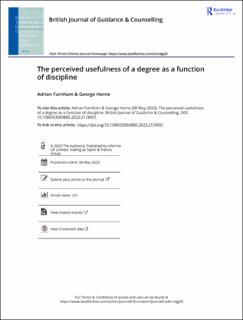| dc.contributor.author | Furnham, Adrian | |
| dc.contributor.author | Horne, George | |
| dc.date.accessioned | 2023-10-02T12:50:06Z | |
| dc.date.available | 2023-10-02T12:50:06Z | |
| dc.date.created | 2023-06-05T08:43:04Z | |
| dc.date.issued | 2023 | |
| dc.identifier.citation | British Journal of Guidance and Counselling. 2023, . | en_US |
| dc.identifier.issn | 0306-9885 | |
| dc.identifier.uri | https://hdl.handle.net/11250/3093491 | |
| dc.description.abstract | Over 500 British respondents rated the extent to which a degree in 35 different subjects/disciplines (Anthropology to Zoology) would lead to useful skills acquisition and thence a well-paid job. These ratings factored into five groups: Social/Applied Natural Sciences and Humanities; Professional and Applied STEM; Languages; People and Information Management; and Pure Science. These ratings were then related to eight individual difference variables (demography, ideology, self-evaluations) through correlational and regression analysis. Applied STEM and Pure Science factors were considered the most useful (with minimal disagreement), whereas there were a number of demographic correlates on the factors considered to be less useful. Speculations are made about the origin and validity of these beliefs. Implications of these results, and limitations are acknowledged. | en_US |
| dc.language.iso | eng | en_US |
| dc.publisher | Taylor & Francis | en_US |
| dc.rights | Attribution-NonCommercial-NoDerivatives 4.0 Internasjonal | * |
| dc.rights.uri | http://creativecommons.org/licenses/by-nc-nd/4.0/deed.no | * |
| dc.subject | Scheduling | en_US |
| dc.subject | Flexible job shop | en_US |
| dc.subject | Fixed sequence | en_US |
| dc.subject | Energy efficient | en_US |
| dc.title | The perceived usefulness of a degree as a function of discipline | en_US |
| dc.title.alternative | The perceived usefulness of a degree as a function of discipline | en_US |
| dc.type | Peer reviewed | en_US |
| dc.type | Journal article | en_US |
| dc.description.version | publishedVersion | en_US |
| dc.rights.holder | Taylor & Francis | en_US |
| dc.source.pagenumber | 0 | en_US |
| dc.source.journal | British Journal of Guidance and Counselling | en_US |
| dc.identifier.doi | 10.1080/03069885.2023.2174951 | |
| dc.identifier.cristin | 2151638 | |
| cristin.ispublished | true | |
| cristin.fulltext | original | |
| cristin.qualitycode | 1 | |

